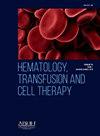Anti-HLA antibody formation increases the chances of platelet refractoriness in platelet-transfused patients: a systematic review with meta-analysis
IF 1.8
Q3 HEMATOLOGY
引用次数: 0
Abstract
Platelet refractoriness caused by alloimmunization to anti-HLA antibodies remains present in daily hemotherapy: the frequent need for platelet transfusions may influence the long-term survival of treated patients. This study aimed to perform a systematic review with meta-analysis to investigate the chances of anti-HLA antibody formation triggering immune-induced platelet refractoriness in platelet transfused individuals. By adopting Preferred Reporting Items for Systematic Reviews and Meta-Analyses (PRISMA) criteria, a search was conducted of publications in online databases between 1976 and July 2022. The risk of bias in the studies was assessed according to the data quality assessment proposed by the ‘A MeaSurement Tool to Assess systematic Reviews’ (AMSTAR-2) tool. Meta-analysis was performed by evaluating the Forest and Funnel Plots. From 832 published articles, 50 were read in full with 14 studies being included in this systematic review. The forest plot showed a likely low heterogeneity (I²: 12.3%; p-value = 0.32), and high odds ratio (174.57; confidence interval: 73.23–416.16) showing platelet refractoriness is triggered by anti-HLA alloantibodies. In this study, anti-HLA antibody formation contributed to an approximate 175-fold higher chance of triggering immune-induced platelet refractoriness. Some explanations about why some statistical differences were observed are offered by studies. This study demonstrates the need for developing policies to identify and monitor anti-HLA antibodies in patients, as well as for HLA matching, and makes some suggestions for future research to promote the prevention of patient sensitization due to platelet transfusions including the development of platelet refractoriness.
求助全文
约1分钟内获得全文
求助全文
来源期刊

Hematology, Transfusion and Cell Therapy
Multiple-
CiteScore
2.40
自引率
4.80%
发文量
1419
审稿时长
30 weeks
 求助内容:
求助内容: 应助结果提醒方式:
应助结果提醒方式:


